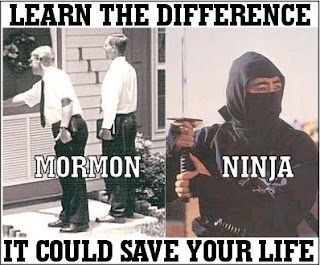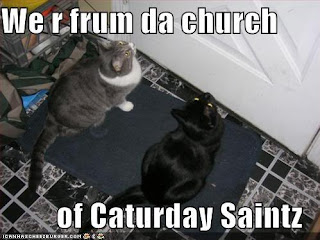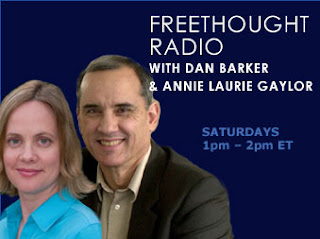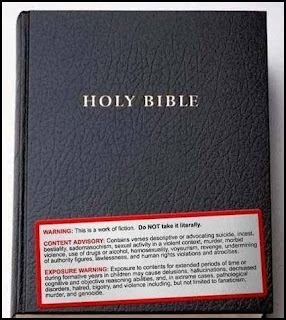
Last night I attended the Dan Barker lecture and it was pretty good. This morning I watched Agora with the atheist group at Sizzler. I have some things to say about both, but for now I'll do a post on the movie. I expect this to be a long review, I like movies so I have a decent amount to say. However, these first couple paragraphs will give a nice overview with no spoilers so I recommend reading a little bit into this post.
Agora was better than I had expected. Looking at reviews such as ones on Netflix there is a range of views and opinions on the movie. Some people think it is a masterpiece while others think it is a horrible movie AND a horrible atheist agenda. Generally I think those last two go hand in hand so I don't really give them much credit. But some people thought it was stupendous and I couldn't really take them all too seriously either. So I fell into the group of people who said it was a good movie, and I didn't expect anything more.
Agora was great. Exceeded my expectations. The set for the movie was very well done, Rachel Weisz of course gave an excellent performance, the music is beautiful, the cinematography does lend some very pretty scenes and nice use of colors, lot's of earth tones and oranges, and there is a coherent story.
Agora is about Hypatia the old world philosopher and mathematician. The story revolves around her within the city of Alexandria during the dying breaths of the Roman Empire. Christianity has now been accepted as a legitimate religion and the Christians regularly are abusing pagans and Jews. Only taking disrespect for their beliefs and gods these other religions soon return the abuse and the chaos builds between accruing acts of violence. In the middle of all this we watch as Hypatia is enveloped in trying to understand the movements of the planets while two men vie for her love: one of her more skeptical students, and her curious slave.
And from here on out there will be spoilers so continue at your own risk of taking the magic out of the movie if you plan on watching it.

The Appollonian Cone
The Movie ItselfAs I’ve stated already, it was a decent movie with good acting, a good budget, good music, and a good story. The quality is good, and it is in English. Course everyone does sound British. I guess Romans were Brits at heart. It has a decently epic feel to it, at least in essence, but it never becomes an epic with high adventures and massive battles. It also has a reverse plot where things gradually get worse and worse and don’t recover, becoming a tragedy with Hypatia’s martyrdom. My only ‘dislike’ is that they use small white font for any words and paragraphs on the screen, such as at the beginning, and end of the movie. Also in the middle in-between the 2-part story. Very hard to read when you have a sandy background.

The Bishop Cyril
Christianity in the MovieRight away I'll state that I give the movie a 4 out of 5 on Netflix, but it is a high 4. I was slightly surprised by how enjoyable the movie did end up being. In trying to figure out what I get from it I decided that this movie is an epitome to the cognitive dissonance people get from religion. The movie upset many Christians, and was difficult to get released into the USA and elsewhere. However, the movie did show some of the good coming from religion, such as the strong Christian sentiment towards giving to the poor and charity. Indeed, when one group rises against the Christians they are quickly sent back because so many of the populace support the Christians, such as the poor and homeless. The first scriptures heard in the movie is the Sermon on the Mount, and helps to inspire Hypatia's slave, Davus, to be converted to Christianity.
However, these good actions are offset by the darker side of Christianity. Later in the movie the bishop, Cyril, reads Paul's sexist words from 1 Timothy. Now, most scholars agree that the clerical letters to Timmy and Titus were not written by Paul but written much later, and I'm not here to argue that. But, like in times past, the scriptures read in the setting of the movie had a goal in mind, to shut up Hypatia, a woman, and to keep her pagan/atheist views out of the government. The Christians eventually drive out the pagans and the Jews.
I did a little research and I cannot be for certain on the Jews, but most scholars agree that the Christians were chiefly responsible for driving out the pagans and sacking the Great Library (my favorite Wonder to build in Civ 4). Though old ideas are often found out to be wrong, we generally build up off of them, and the destruction of the knowledge of the Great Library could be seen as a symbol of the coming Dark Ages. Indeed, while destroying the works the camera pans through the dome till it is looking at the rampage upside-down. St. Pickle next to me commented that the world was being turned upside-down itself.

The Prefect Orestes
The Devastating Power of FaithThe movie displays some Hollywood-esque thought processes by being too simplistic in odd ways. The Christians generally are wearing black attire, clearly presenting the ‘bad-guys’ to the audience. After massacring many Jews they gather the bodies and burn them, which to me came very close to the Holocaust in its intent. However, even the pagans are not portrayed as wonderful, owning slaves, and their pride and selfishness getting the best of them. There are times when we want to like many of the characters but the ones we identify with most are the ones who don’t believe as strongly as others.
Hypatia admits to having no beliefs in gods, but philosophy. Orestes, her student who later becomes the Roman Prefect, calls himself a Christian but it is strongly hinted that he doesn’t really believe. Davus turns to Christianity, but he sometimes expresses skepticism he learned from Hypatia. Looking at the pile of burning Jew corpses Davus asks the man who converted him, Ammonius, if he speaks to God and if he wonders if they could all be wrong. The most destructive characters in the movie are those who believe the most in their gods, from the pagan leaders, to Cyril the bishop. They act because they ‘know’ it is what their god wants, and it often hurts others, or their own followers.
One of the main lines from the movie is when Orestes approaches Hypatia about converting to Christianity for the sake of trying to keep the peace. She quips that he is peddling faith and then a former student turned Christian, Synesius, tries to get her to convert, to which she replies, “You don’t question what you believe. You cannot. I must.”

The philosopher Hypatia
Accurate History?Many people against it say it is an atheist agenda movie and bring up inaccuracies about the history. After doing some more research I’ve been able to look more clearly at the story. Hypatia did live at the time the Great Library was destroyed in 391 CE. For an event like that we know the exact year. It was either destroyed by Christians, Romans, or both. The movie portrays the most commonly held understanding: the pagans looted it on their way out, and the Christians came in and desecrated the library and grounds (Serapeum).
Hypatia was murdered by Christians, though on the way of ‘how’ is disputed by some ancient historians. Cyril is portrayed as a vindictive bishop, often spouting ambiguous words and sermons which not so subtly get his followers riled up into murderous frenzies. The movie does not directly implicate Cyril for Hypatia’s murder, but many historians believed he ordered her death. He also did take considerable power after Orestes left Alexandria. Cyril is thought of as a Saint on some anti-Agora blogs, but a brief overlook into his history shows evidence of major corruption and power-hungry behavior. Indeed, Ammonius, the man who converted Davus and also threw a stone at Orestes, was killed for his treason yet Cyril declared him a martyr. In the movie he also declares him a Saint, but this is inaccurate.
One of the main plot-lines is Hypatia’s science and her studies into astronomy and the movements of celestial bodies. She remains single throughout the movie, wholly devoted to her studies where Christianity seems to be fighting against her. Though she is historically represented as one of the greatest early philosophers on mathematics and astronomy no works are in existence today, though we know she had written things down. The movie has her discover that Aristarchus’s Heliocentric model is correct though she never got a chance to write it down, or to tell anyone except her slave. Again, the movie symbolizes how religion has, in the past and present (with Creationism) shut up opposing philosophical and scientific views to its own. Hypatia continuously reexamines her views and improves upon them, whereas we watch Davus with his sparks of intellect slowly get into the mindset of answering questions with “only God knows.”

Davus the former slave
Cognitive DissonanceThis movie is full of it. The best scene being when Cyril reads from 1 Timothy – “
I desire women to dress modestly, with decency and propriety, not with braided hair or gold or pearls or expensive clothes, but with good deeds… Let a woman learn in quietness and in full submission. I do not permit a woman to teach or to have authority over a man, but to be in silence.”
Orestes and others are present and he expresses concern as to why Cyril would be reading this, understanding it is Cyril’s subtle way of saying that Hypatia should not be allowed to speak in the government. Even the people watching the movie had to chuckle at the absurdity of the scriptures and their intended use being so apparent.
In the normal scenes slavery is never approached, Hypatia never acknowledging that having slaves is a bad thing, or anyone else for that matter. The killing of Jews however brings about doubts with Davus. Participating in the killing Hypatia walks through the massacre and spots him. Davus hides his face and glances at the blood dripping from his sword. Later, when looking at the burning corpses he expresses doubt in their faith. Hypatia and Orestes try to find unity to hold people together, while the religious views tear the people apart. Cyril defends his followers who were stoning Jews by stating that the Jews were at the theatre on the Sabbath, not keeping with their own beliefs.
Orestes and Hypatia defend their Christian brothers when the battle between pagans and Christians breaks out. Davus is torn through by the slavery of paganism or the freedom of Christianity. The pagans and Christians end up killing each other because they mock each other’s gods and Theon, Hypatia’s father, looks on in horror at what is happening. Because their religious views differ the Christians destroy the Great Library instead of continuing the great scientific history that it contained, some of the theories back then holding true today. Who knows what else we lost.
Orestes holds back from arresting Cyril, even though Cyril sent out a proclamation to kill all the Jews, women and children. Fear of Christians often gets the results Cyril or the other bishops want, not diplomacy or compromise. Synesius admits that he cannot doubt his religion or God. Later, Davus tries to save Hypatia while others call her a witch and ungodly.

Throughout the movie we watch as people see the world and know it isn’t quite right, but either are too prideful or too afraid to change it. Often the ills are brought about not because of religious beliefs, but religious differences, and those following those beliefs don’t question what they are doing, or if they do they stop short of changing. The movie is a nice collage of the destructive behavior of religion, and holds a lot of symbolism for the more subtle negativity religion brings into the world today.
No forthright agenda is made clear however. The pagans generally fight the Christians the most but are prideful, sexist, and have slaves. Only the Jews come off as the most polite, until they trick and kill the Christian enforcers, which in turn wipe them out. The only message I can clearly see is the separation of church and state, that Orestes tried to keep the government secular, in hopes of having peace between the different groups. However, Cyril eventually not only displaces the other belief systems, he eventually takes control of the government. Many intelligent people can see the problems in this, especially in America. After assaulting the Christians the pagans are pushed back into the Serapeum because “there are so many Christians.” I think this reflects the fears of many non-Christians in the USA, especially when governmental figures and the media speak so poorly of non-believers, or say that this is a Christian nation and atheists should get out.
However, I think that as a species we are generally learning to learn from our mistakes. We need to learn faster, but I think we’re doing it. Moderate religion is far more accepting, and moderate. The world we live in is far better than it used to be.



























